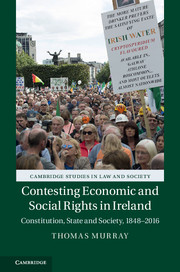Book contents
- Frontmatter
- Dedication
- Contents
- Acknowledgments
- Introduction: The Politics of Economic and Social Rights
- 1 Constitution ‘from Below’ in Ireland: 1848–1922
- 2 ‘Not Alone Personal Liberty but Economic Freedom’: Socio-economic Rights in the Making of the 1922 Irish Free State Constitution
- 3 ‘Highly Dangerous’? Socio-economic Rights in the Making of the 1937 Irish Constitution
- 4 Contesting the Irish Constitution and the World-System: 1945–2008
- 5 The Polarities of Justice and Legal Business
- 6 Contesting Property Rights
- 7 Contesting Trade Union Rights
- 8 Contesting Family, Education, andWelfare Rights
- 9 Reproducing the Value-Consensus State
- 10 Constitution ‘from Below’ in Ireland: 1945–2008
- Conclusion: Contesting Economic and Social Rights Today
- Bibliography
- Index
8 - Contesting Family, Education, andWelfare Rights
Published online by Cambridge University Press: 05 August 2016
- Frontmatter
- Dedication
- Contents
- Acknowledgments
- Introduction: The Politics of Economic and Social Rights
- 1 Constitution ‘from Below’ in Ireland: 1848–1922
- 2 ‘Not Alone Personal Liberty but Economic Freedom’: Socio-economic Rights in the Making of the 1922 Irish Free State Constitution
- 3 ‘Highly Dangerous’? Socio-economic Rights in the Making of the 1937 Irish Constitution
- 4 Contesting the Irish Constitution and the World-System: 1945–2008
- 5 The Polarities of Justice and Legal Business
- 6 Contesting Property Rights
- 7 Contesting Trade Union Rights
- 8 Contesting Family, Education, andWelfare Rights
- 9 Reproducing the Value-Consensus State
- 10 Constitution ‘from Below’ in Ireland: 1945–2008
- Conclusion: Contesting Economic and Social Rights Today
- Bibliography
- Index
Summary
…As a mother having him actually look at me and acknowledge that he knew I existed, you know, that recharges a mother. It enabled me to bring much more of myself to him. In practical ways within the family the fact that he was looking at brothers and sisters reinforced their interest in him. You know everything seemed to run better…every single thing he gained had huge practical consequences for us…
– Kathryn Sinnott, 2001[T]he rights to be found in the Constitution, anyway as elaborated by the judiciary, on the whole, protect the advantaged more than the disadvantaged. Examples are the rights to reputation, privacy and property and the right to do business (It is worth noticing that no one seems to have suggested that the last two are socio-economic rights and, hence, that they ought not to receive strong judicial protection). By contrast, the rights, which might help the disadvantaged – equality, free speech and socio-economic rights – have not been emphasised by the judiciary.
– David Gwynn Morgan, 2002Solicitor Michael O'Mahony responded critically to the publication of the Kennedy Report (1970) into industrial school reform. He argued that the statutory definition of an ‘industrial school’ (‘a school for the industrial training of children in which children are lodged, clothed and fed as well as taught’) was inaccurate: ‘a place of detention would be closer to reality’. At the Children's Court, children usually appeared without legal representation, the majority making ‘involuntary confessions’, or admitting guilt for fear of worse punishment. Insufficient numbers of social workers ensured that children were committed for want of time to investigate their respective situations. Similarly, for want of an interested party to act on the child's behalf, appeals were almost never taken. These practices, O'Mahony claimed, raised potential constitutional claims as to ‘whether all citizens are in fact equal before the law…’ Owing to the cost of legal services, however, such challenges were unlikely to arise.
The development of family, education, and welfare rights contestations in Ireland, as O'Mahony's article indicates, cannot be understood in isolation from the semi-peripheral development of the Republic of Ireland and its welfare state. Evident in the 1922 and 1937 constitution-making processes, successive Irish governments prioritised securing stable capital flows for dominant class interests.
- Type
- Chapter
- Information
- Contesting Economic and Social Rights in IrelandConstitution, State and Society, 1848–2016, pp. 245 - 270Publisher: Cambridge University PressPrint publication year: 2016



